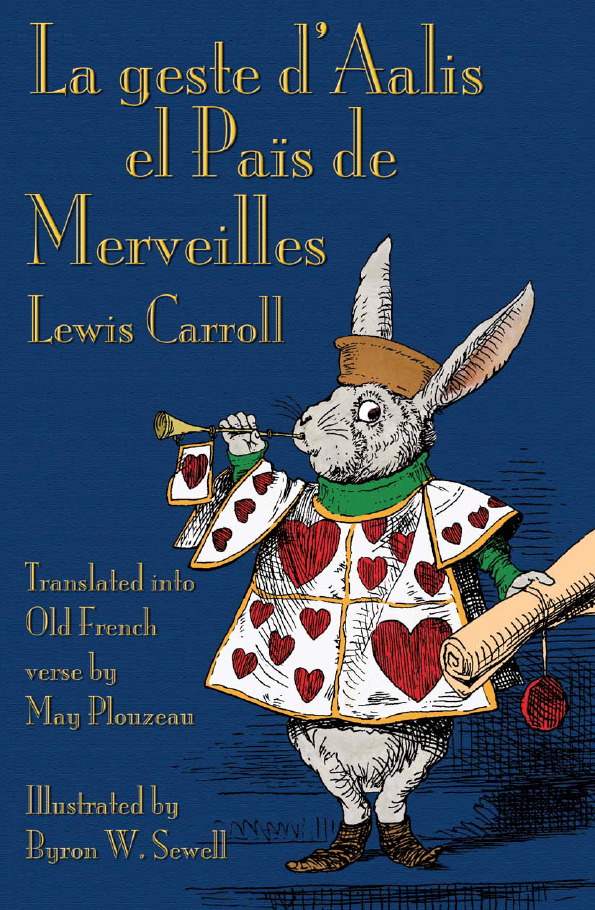La geste d’Aalis el Païs de Merveilles
Alice’s Adventures in Wonderland in Old French verse

By Lewis Carroll, translated into Old French verse by May Plouzeau
First edition, 2017. Illustrations by Byron W. Sewell. Portlaoise: Evertype. ISBN 978-1-78201-174-3 (paperback), price: €13.95, £12.95, $15.95.Click on the book cover on the right to order this book from Amazon.co.uk!
Or if you are in North America, order the book from Amazon.com!
|
Sa destre poe leva en haut li Chaz, Oez, seignor, ce que respondu a : « Uns Chapeliers maint et vit cele part, Et ceste part vit uns Lievres de Marz. » Et l’autre poe au vent de l’air lança. |
The Cat lifted on high its right paw, Listen, gentlemen, to its answer: “A Hatter stays and lives in that part, And in this part lives a March Hare.” And he waved the other paw in the wind of the air. |
|
|
Ce dist li Chaz, qui siet el bois ramé : « Cel qu’eslirez poez vos visiter, Ambedui sont et fol et estapé. » « Mais pas ne vueil o foles genz aler », Ce dist Alis. Lors respondi li ber : « Bele, de ce ne vos poez garder : En ceste terre somes tuit forsené, Et gié et vos. » « Et coment le savez ? » Dist Aalis. « Faites pais, si m’oez », Respont li Chaz, « pas ne vos iert celé. » |
Thus spoke the Cat, who sits in the branchy wood: “You can visit the one you’ll choose, Both are raving mad.” “But I don’t want to go with mad people,” Said Alis. Then the worthy fellow answered: “Fair one, you can’t help that: In this land, we are all out of our minds, I am and so are you.” And how do you know it? ” Said Aalis. “Be quiet, listen to me ,” Answers the Cat, “ it won’t be concealed from you.” |
|
|
En sorïant dist : « Celé ne vos iert : Forsenee estes, bien le sai senz cuidier, Se nel fussiez, ici ne venissiez. » |
Smiling it said: “Concealed it won’t be from you : You’re out of your mind, I’m sure of it, If you weren’t, you’d not have come here.” |
|

|
||
| L’ancien français, qui se parla et s’écrivit, grossièrement, du milieu du 9e siècle au milieu du 14e siècle, connut de multiples variations selon temps et lieux, et nous en conservons des textes innombrables. | Old French was spoken and/or written in many parts of what is now France, very roughly north of the Loire, and in parts of Belgium ; it was also used in numerous circles in England, notably after the Norman conquest. It extended roughly from the middle of the ninth century to some time in the fourteenth century. It never stopped evolving, and there was much regional variation. Innumerable texts are written in that language, which gave birth to many literary genres. | La geste d’Aalis el Païs de Merveilles est un de ces textes, lequel avait jusqu’à récemment échappé à l’attention des médiévistes. Long de 5517 vers, il se présente sous la forme d’une chanson de geste en décasyllabes assonancés ; le contenu est celui d’une chanson d’aventures. Un Glossaire et une Introduction sont joints à l’édition. La langue d’Aalis étant limpide, le premier renferme seulement hapax, néologismes et mots régionaux ; leur détermination spatiale et temporelle a été puisée chez les plus grands savants (Matsumura, Möhren, Roques, etc.), et est justifiée dans chaque article. La seconde est solidement traditionnelle : elle étudie notamment langue du scribe, de l’auteur (de l’Ouest), date de composition (avant 1250 ?), sources, influences. On y démontre que Lewis Carroll est celui qui s’est le plus inspiré d’Aalis : dans Alice's Adventures in Wonderland, il supprime certes les nombreux traits de civilisation médiévale et procédés de composition épique de la chanson, mais pour le reste suit fidèlement la narration, démarque avec soin les spécificités langagières des personnages ainsi que la douzaine de pièces en vers rimés que contient Aalis ; enfin, il prend la peine de transposer adéquatement la cinquantaine de jeux de mots qui émaillent le texte. | Aalis is written in a western variation of French, composed ca 1250 in the form of a chanson de geste which is versified in stanzas of assonanced decasyllables. But the songs and poems of Carroll are rhymed in Aalis; they are either translated faithfully or are parodies of French well known poems. Practically all the puns have been transposed, and so have most traits of nature or culture (food, animals, money, measure of time and space, knowledge, language, etc.); e.g. a canary becomes a nightingale, guinea-pigs, weasels; substandard English is rendered by picardisms; whereas Alice believes that the Mouse is a French mouse, come over with William the Conqueror, Aalis, a little French girl, thinks it came from Scandinavia with Rou (who settled in Normandy in the 9th century), and accordingly, instead of asking the Mouse “Où est ma chatte?” she says “Hvar er köttr minn?” and so on. Yet (in the realm of nonsense, let’s misbehave!), outrageous anachronisms or lexical monsters have occasionally been introduced; they are listed in the Glossary, which points out words which are found only in Aalis and the French words which are seen there for the first time. And the Introduction, which mimics a 19th-century one, studies the language of Aalis, the texts it quotes, and those it has influenced, which leads to a close scrutiny of Carroll’s modus operandi while transposing Aalis to Alice. |
—May Plouzeau Marseille 2017 |
—May Plouzeau Marseille 2017 |